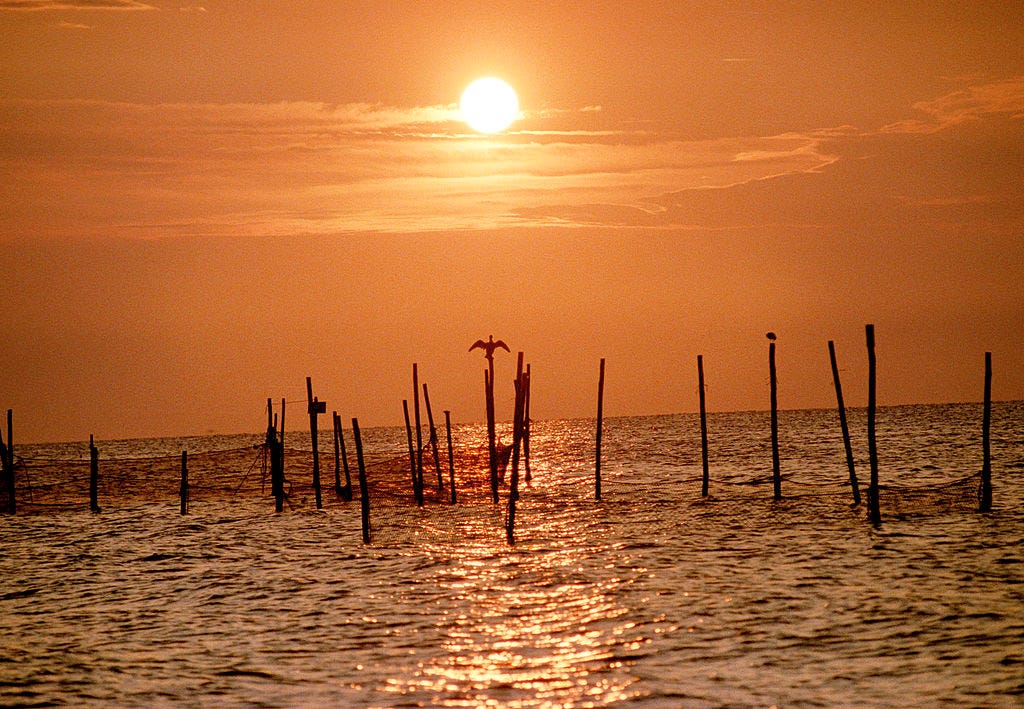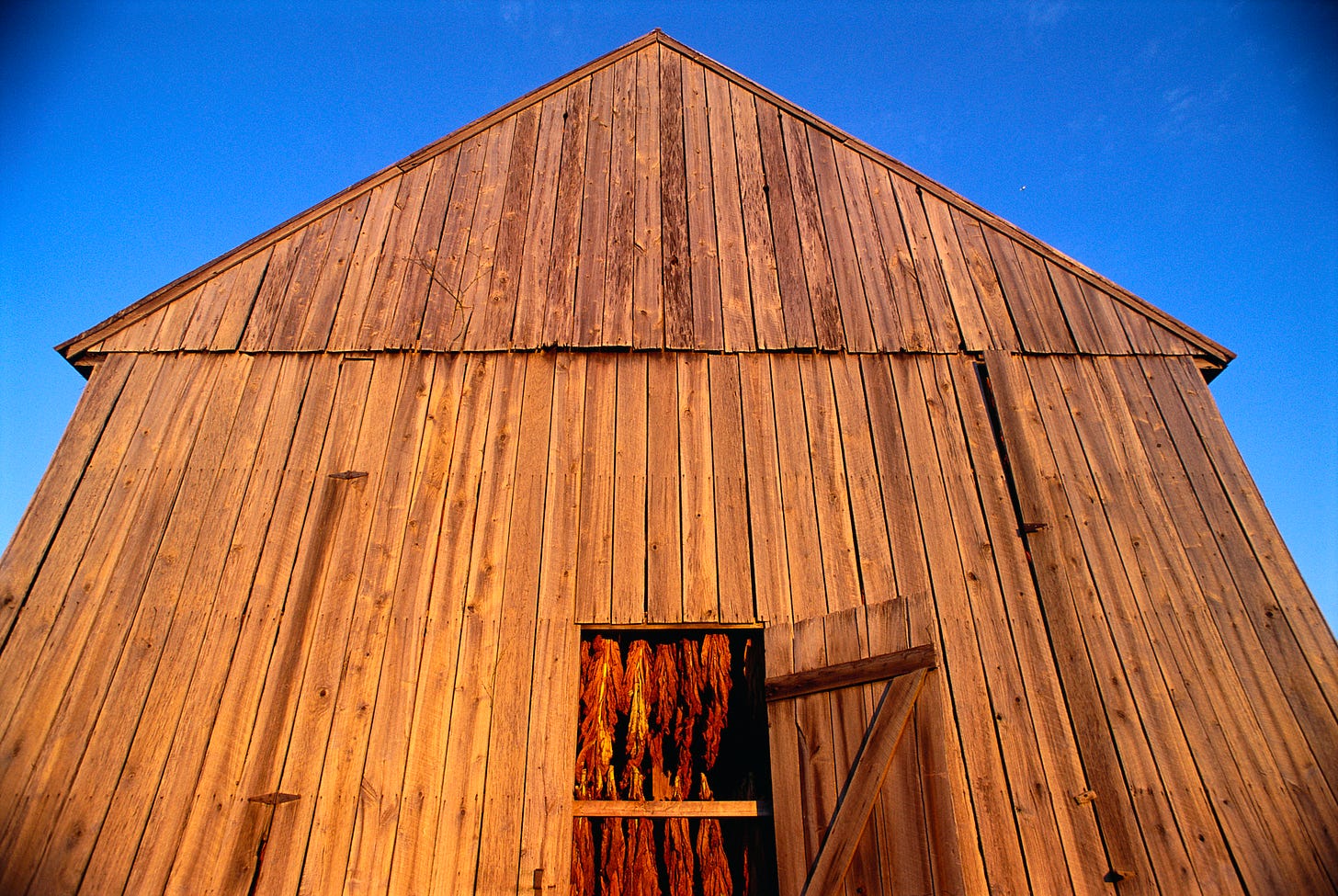Chesapeake Stories
Unlike in North Carolina and Virginia, Maryland tobacco did not lend itself to mechanization. In the 1960s, almost all the work was still being done by hand, and at the end, by sons and cousins.
Friday, November 8th, 2024
Bill Bonner, writing today from Baltimore, Maryland
It should come as no great surprise that a Democratic Party which has abandoned working class people would find that the working class has abandoned them.
—Bernie Sanders
Last weekend included long overdue visits with neighbors and cousins.
“I started out growing tobacco, too,” said an old black man from across the road.
We reminisced, sharing memories of a forgotten way of life.
“Damn, it was hard work... and I was glad to get away from it. But I never got away from the land.”
Our neighbor’s farm has one of the last tobacco barns built in the area. In the 1950s, tobacco was a cash crop. It paid... and paid well. Farm boys, working their own plots of land, were able to save enough money to buy new automobiles when they turned 16. Building a large, handsome barn to hang the tobacco in, was still a good investment.
Maryland tobacco was air cured. The big barns had spaces between the sheathing boards — almost always made of tulip poplar — that allowed the air to flow. Inside, poles were set every six feet or so high and about six feet apart. The tobacco was ‘speared’ onto split hickory (later sawn) sticks and hung between the poles.
This work was done in late August or September, typically, when it was very hot and humid. We’d begin early in the morning, when the dew was still heavy on the plants…and the sun still low on the horizon. Bending over, we hacked the plants off at the base and laid them in a row. Over lunch, they would go limp and could be speared in the afternoon.
Each part of the operation had its inconveniences, but ‘hanging’ was probably the worst. The tobacco sticks had to be lifted up by hand to the crown of the barn, under the roof, where the sun on the tin made the heat almost unbearable. We positioned ourselves on boards... three or four of us... each one higher than the other... and passed the sticks, heavy with five or six tobacco plants, up to the top.
By the end of the day, which could come long after dark, we were dripping with sweat and exhaustion.
Typically, each farm had its owners... its family members... and some Black tenants... who worked together to get the job done. But by the 1970s, the tobacco economy was in trouble. Farmers could still plant. But there was no one to harvest. Families were smaller. And young men left the farms to work in the cities. The Black tenant labor disappeared too... presumably relocated to Washington DC for better wages and (certainly) better working conditions.
Unlike in North Carolina and Virginia, Maryland tobacco did not lend itself to mechanization. In the 1960s, almost all the work was still being done by hand... and at the end, by sons and cousins rounded up before they went back to school.
Then, in the 1970s, inflation in the US raised production costs, while imported tobacco from Brazil and Zimbabwe kept selling prices fairly low.
We went off to college in 1966. When we came back in 1970, the tobacco economy — which had existed in the Maryland tidewater area almost unchanged since the early 1600s — was facing extinction. And today, only the Amish in Charles County still do it.
“I got out too... as soon as I could,” our neighbor told us. “You can see for yourself. These trees,” he said, pointing out to what used to be tobacco fields, “are about fifty years old... they grew up when we stopped growing tobacco.”
“I gave up on tobacco. But I didn’t give up on the land. I remember my grandfather... when I was just a boy. I was working in the tobacco fields. And he reached down and got a handful of dirt. And he practically threw it in my face.
“Smell that, boy,” he said. “Don’t ever forget that smell. That’s the smell of dirt. Never give up on the dirt.”
“I didn’t know exactly what he meant. And I left like everyone else... and went into Washington and had a career in banking. But I never forgot about the dirt. So, I held onto the farm even after we didn’t do any farming. I still have it. And I don’t want to leave it. It’s the only place where I really feel at peace.
“Of course, at my age, I’m looking for a different kind of peace now... I’m going to join that dirt soon. I’m ready for it.”
On Sunday, we took a boat ride around the West River. The sun was bright. The air was clear, sharp, and cold. The trees, along the water’s edge, were brightly colored.
Traditionally, there were ‘watermen’ who lived on the shores of the Chesapeake. And there were farmers, who lived on higher ground. The two groups, although living cheek by jowl for hundreds of years, rarely mixed.
An exception was a cousin who gave up tobacco farming for ‘oystering’ on the bay. Now, he is retired, but lives only a few feet from the river... where he keeps a boat.
“I’ve been coming to this creek [an inlet of the West River] for 65 years,” he explained.
“We used to come out here to go duck hunting. There weren’t any houses on this part of the river back then. So, we’d come over here on a boat, and then, sneak across the stretch of land there in front of us... and try to creep up on the mallards on the other side.
“Usually, we’d get one or two and take it home for dinner.
“We came over here to ice skate too. One time, three of us — we were probably fourteen years old, and not too smart — came over on the ice. Hard to believe today, but back then the whole river froze over solid... and it’s salt water. So, it must have been a lot colder back then.
“The ice was solid out in the middle of the river, but when you got up to the shore, it was usually weak... because of the movement of the waves and the tides. So, we thought it would be fun to try to get onto the shore without getting wet.
“Ashby [a friend] led the way. But the ice broke under him and he went in about waist high. I went second. I thought I was being smart, by trying to slide over to the shore, gently and slowly. But the same thing happened to me. I went into the cold water, about up to my chest. Man, it was cold.
“Kenny [third of the trio] was laughing and laughing.
“I’ll show you how to do it,” he said. And he started getting up speed. He was going to skate as fast as he could. I guess he thought that if he went fast enough he wouldn’t break the ice. But instead, when he got to the weak spot, I heard the ice crack... and he went down. But he was going so fast, he just kept going until he was completely under the ice.
“Good Lord, he was trapped under the ice. I knew we only had a few minutes to get him out or he was going to drown. Ashby and I went running over to where he had gone under. We thought we would stomp on the ice to break it up. But just as we were getting there, the ice suddenly welled up... .and Kenny broke through. He was like a sea monster rising up.
“He was soaked and almost froze to death afterward. But he just laughed and laughed ‘til we got back home.”
Regards,
Bill Bonner




Thank you Bill! The truth is that we grew up in such a beautiful America🇺🇸. Before LBJ, we had peace and mostly harmony. It was such a blessing growing up in an Irish Catholic family who valued family, God and country over money or anything else. The money came in life due to our values and work ethic. I thank Our Lord Jesus everyday for the grace he has given us and thank God every day for the gift of being born an American 🙏🇺🇸🇺🇸🇺🇸
I think that a lot of blue collar workers voted for Trump because his tariffs will likely force foreign companies to move production to the U.S. to avoid them. This will give workers decent jobs here that will ultimately lead to a better GDP and economy. Under harris/biden most of the jobs created were government jobs and they detract from the economy and just add to our debt. Will it be painful, hell yeah. Instead of the cheap goods we are addicted to from adversaries like China we will have to pay more for domestic industry but ultimately we will be independent and not reliant on dangerous foreign countries for our goods. Also, blue collar workers saw how the dems kept trying to buy votes at their expense such as transferring student loan debt of rich elites onto their backs even after the Supreme Court told them it was Unconstitutional.